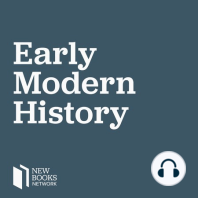67 min listen

Guido Ruggiero, "Love and Sex in the Time of Plague: A Decameron Renaissance" (Harvard UP, 2021)
Guido Ruggiero, "Love and Sex in the Time of Plague: A Decameron Renaissance" (Harvard UP, 2021)
ratings:
Length:
55 minutes
Released:
Nov 16, 2022
Format:
Podcast episode
Description
Today Jana Byars talks to her PhD advisor Guido Ruggiero about his latest monograph, Love and Sex in the Time of Plague: A Decameron Renaissance (Harvard University Press, 2021) over the meaning of love in the early Renaissance. As a pandemic swept across fourteenth-century Europe, the Decameron offered the ill and grieving a symphony of life and love. For Florentines, the world seemed to be coming to an end. In 1348 the first wave of the Black Death swept across the Italian city, reducing its population from more than 100,000 to less than 40,000. The disease would eventually kill at least half of the population of Europe. Amid the devastation, Giovanni Boccaccio's Decameron was born. One of the masterpieces of world literature, the Decameron has captivated centuries of readers with its vivid tales of love, loyalty, betrayal, and sex. Despite the death that overwhelmed Florence, Boccaccio's collection of novelle was, in Guido Ruggiero's words, a "symphony of life." Love and Sex in the Time of Plague guides twenty-first-century readers back to Boccaccio's world to recapture how his work sounded to fourteenth-century ears. Through insightful discussions of the Decameron's cherished stories and deep portraits of Florentine culture, Ruggiero explores love and sexual relations in a society undergoing convulsive change. In the century before the plague arrived, Florence had become one of the richest and most powerful cities in Europe. With the medieval nobility in decline, a new polity was emerging, driven by Il Popolo, the people, fractious and enterprising. Boccaccio's stories had a special resonance in this age of upheaval, as Florentines sought new notions of truth and virtue to meet both the despair and the possibility of the moment.
Jana Byars is the Academic Director of Netherlands: International Perspectives on Sexuality and Gender.
Learn more about your ad choices. Visit megaphone.fm/adchoices
Jana Byars is the Academic Director of Netherlands: International Perspectives on Sexuality and Gender.
Learn more about your ad choices. Visit megaphone.fm/adchoices
Released:
Nov 16, 2022
Format:
Podcast episode
Titles in the series (100)
Daniela Bleichmar, “Visible Empire: Botanical Expeditions and Visual Culture in the Hispanic Enlightenment” (University of Chicago Press, 2012): Daniela Bleichmar‘s new book is a story about 12,000 images. In Visible Empire: Botanical Expeditions and Visual Culture in the Hispanic Enlightenment (University of Chicago Press, 2012), Bleichmar uses this vast (and gorgeous) archive of botanical ima... by New Books in Early Modern History